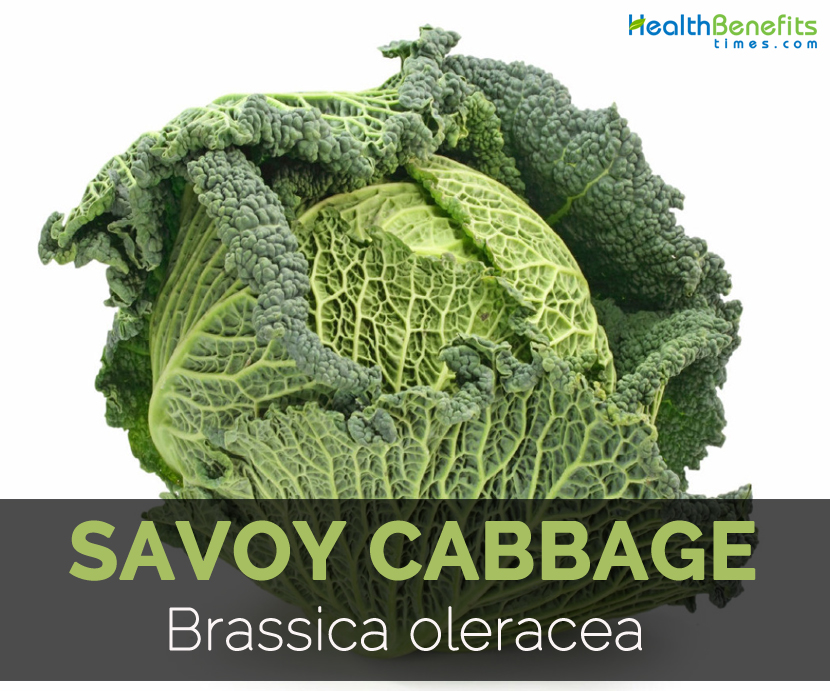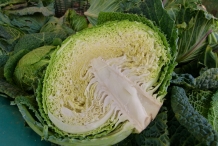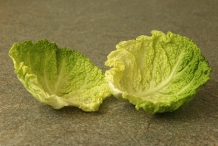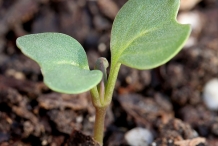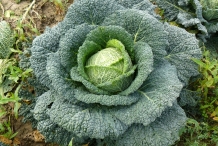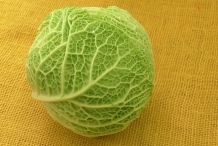Savoy cabbage is added to various recipes and cuisines. It combines well with red wine, chestnuts, spices, caraway, juniper berries, apples, sage, onions, meat, sour cream, dill fennel and horseradish. It could be added to stews, roulades, soups and roasted plain sprinkled with olive oil.
Plant
Savoy cabbage is a cool season biennial vegetable which grows up to 20-60 cm high. The plant grows a compact, round – flattened or pointed head consisting of puckered, overlapped, wavy with curly leaves. The leaves features from blue to green in color. The head of the Savoy cabbage weighs about 3-4 pounds. The plant bears the small, four petaled yellow flowers during the summer season.
Nutritional value
By consuming 70 grams of raw Savoy cabbage, it provides 19 calories, 1.4 grams of protein, 0.07 grams of fat, 4.27 grams of carbohydrate, 2.2 grams of dietary fiber and 1.59 grams of total sugars. The same serving size grants 40.17% of Vitamin K, 24.11% of Vitamin C, 14% of Vitamin B9 and 10.23% of Vitamin B6. The minerals such as 24 mg of Calcium, 0.28 mg of Iron, 20 mg of Magnesium, 29 mg of Phosphorus, 161 mg of Potassium, 20 mg of Sodium, 0.19 mg of Zinc, 0.043 mg of Copper, 0.126 mg of Manganese and 0.6 µg of Selenium could also be obtained.
Health Benefits of Savoy cabbage
Savoy cabbage is free of fats, cholesterol and rich in vitamin A, K, C and B6. It also possess protein, fiber, iron, manganese, folate, thiamin, potassium, calcium and magnesium. It provides low amount of calories. The phytonutrients found in Savoy cabbage act as an antioxidant which helps to lower the chances of cancers.
- Gum health and teeth
The diet low in Vitamin C, A, D and K is associated with the chances of cavities and gum disease. The intake of foods rich in Vitamins assist in the mineralization of teeth and bones. The foods rich in minerals and vitamins helps to eliminate the bacteria present in mouth. Vitamin K works with the other vitamins and minerals which prevent the bacteria that damage the enamel and cause tooth decay.
- Promotes brain health
Vitamin K involves in the metabolism of sphingolipid which is the molecules that occur naturally which are found in the cell membranes of cell. The study shows that Vitamin K possess an anti-inflammatory properties that prevents the oxidative stress caused due to the damage made by free radicals. Oxidative stress damages the cells and contributes to the health ailments such as Parkinson’s. Alzheimer’s disease and heart ailments.
- Prevents cancer
Vitamin K helps to reduce the chances of colon, prostate, nasal, stomach and oral cancer. The study shows that high intake of Vitamin K by the liver cancer patients helps to enhance the functions of liver. The increase in the consumption of Vitamin K helps to reduce the chances of cancer and cardiovascular conditions.
- Treats gout
Vitamin C helps to lower the chances of gout which is a painful condition in which the big toe is afflicted. It becomes inflamed, stiff and painful due to the excess presence of uric acid that leads to the formation of crystals in joints.
The study shows that the intake of 1000 to 1499 mg of Vitamin C regularly helps to reduce the chances of gout by 31% in comparison to those who did not intake.
- Encounter free radicals
Vitamin C is an antioxidant which prevents the damage of free radicals, pollutants and toxic chemicals. Free radicals results in the health ailments such as heart disease, cancer and arthritis. The free radicals buildup in the body during the breaking down of food and when exposed to tobacco, smoke or radiation.
- Absorbs minerals
The body should function properly to absorb the nutrients from food; the digestive system should absorb the nutrients from the food. The cells absorb the nutrients and vitamins which reduces the inflammation and risk of disease in the body. The intake of Vitamin C with iron raises the iron absorption in the children and adults.
- Healthy heart
Vitamin B helps to reduce the homocysteine levels in blood. Homocysteine helps to increase the chances of strokes and heart attacks. It helps to maintain the homocysteine levels and has a positive effect in the metabolizing process of minerals as well as antioxidant activities. The studies shows that high intake of folate reduces the chances of cardiovascular diseases in comparison to those who intakes low. The research shows that the supplements of Vitamin B12 can reduce the chances of cardiovascular disease and also protects from stroke.
- Pregnancy
Folate is the vital vitamin for the healthy pregnancy. The deficiency of folate during pregnancy results in neural tube defects such s anencephaly, spina bifida, heart complication and limb malformations. Folate acts as coenzyme in the single carbon transfers for metabolism of amino acids and synthesis of nucleic acids. Folate is essential for copying DNA and form new cells. Sprouted beans, leafy greens, citrus and avocados are the foods rich in folate.
- Assist digestion
Both fibers are required for the digestion. Insoluble fiber provides bulk to stool. It also speeds up time to pass out the waste which prevents bloating, indigestion and constipation. Soluble fiber absorbs the water convert into viscous and gelatinous substance and ferments bacteria in digestive tract which also enhances digestion. Fiber requires water for performing effects. So one should drink plenty amount of water for the digestive relief.
- Treats diabetes
The soluble fiber helps to slow down the digestion and maintains the level of blood sugar. It enhances the sensitivity of insulin and controls the spikes of blood sugar and conditions such as diabetes. There is inverse relationship between the glucose levels in dietary fiber and blood. The high intake of fiber prevents the resistance of insulin which is formed from the rising levels of glucose.
How to eat
- This cabbage could be steamed and served with fish.
- Sauté Savoy cabbage boiled potatoes, onions and garlic.
- Stuff rice, potatoes, ground meat in the leaves.
- It could be added to minestrone.
- Sauté cabbage with spaetzle and bacon.
- Shred cabbage with carrots; season it with apple cider vinegar, sugar, salt for making Cole slaw.
- Sauté cabbage, onions, bacon and toss with the egg noodles.
- Savoy cabbage could be added to various recipes.
- It combines well with red wine, chestnuts, spices, caraway, juniper berries, apples, sage, onions, meat, sour cream, dill fennel and horseradish.
- It is used in roulades, stews, soups and roasted plain sprinkled with olive oil.
- It could be used as wrap for stuffing.
- This vegetable could be consumed raw, steam, pickle, sauté, stew or braised.
- Cabbage and bean curd are predominant for Chinese cooking.
- It is apparently featured in Polish cuisine.
- In Ethiopia and India, cabbage is added to braises and spicy salads.
- In Romania and Hungary, cabbage is featured as a vital ingredient.
Comments
comments
| Savoy Cabbage Quick Facts | |
|---|---|
| Name: | Savoy Cabbage |
| Scientific Name: | Brassica oleracea (Capitata Group) |
| Origin | Coastal Southern and Western Europe |
| Colors | Blue to green (Leaves) |
| Shapes | Puckered, overlapped, wavy with curly (Leaves) |
| Taste | Mild, sweet |
| Calories | 19 Kcal./cup |
| Major nutrients | Vitamin K (40.17%) Vitamin C (24.11%) Vitamin B9 (14.00%) Vitamin B6 (10.23%) Total dietary Fiber (5.79%) |
| Health benefits | Gum health and teeth, Promotes brain health, Prevents cancer, Treats gout, Encounter free radicals |
| More facts about Savoy Cabbage | |
